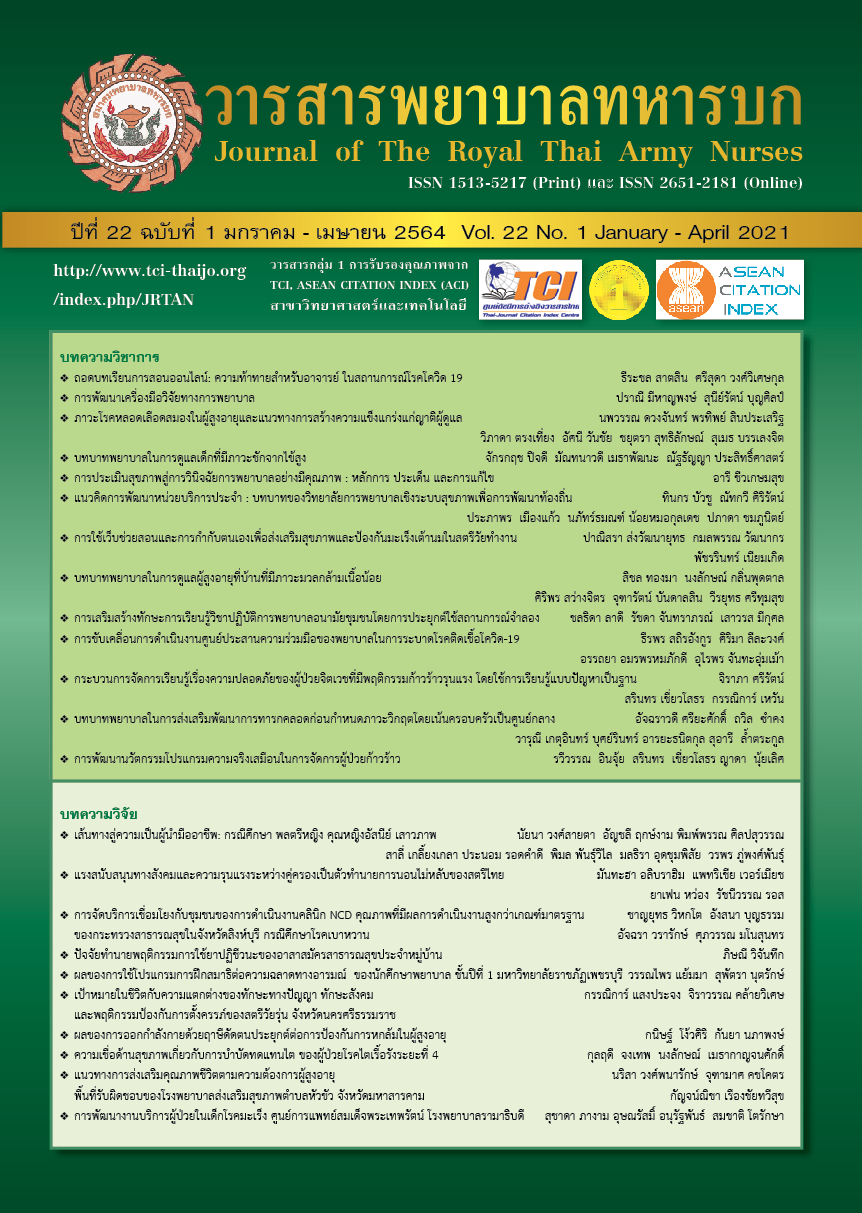Development of Curriculum for Enhancing the Elderly Competencies in Health Promotion and Prevention of Complications from Non-communicable Diseases at Had Chao Samran Elderly School, Muang, Phetchaburi
Keywords:
curriculum development, enhancing competencies, quality of life, elderly schoolAbstract
This research aimed to develop the curriculum and to evaluate the effectiveness of the curriculum for strengthening competencies of the elderly on health promotion and prevention of complications from non-communicated chronic diseases at Had Chao Samran elderly school, Muang, Phetchaburi. The curriculum was developed using a participatory action research. The effectiveness of the curriculum was assessed using a quasi-experimental research with one group pretest-posttest design. Participants consisted of 30 elderly school students. Data on the operational effectiveness of the curriculum were collected using a questionnaire developed according to the CIPP Model. Data on the quality of life were collected using a Senior Fitness Test (SFT) battery, and a Thai version of the brief form of the World Health Organization Quality of Life (WHOQOL-BREF-THAI) instrument. The data were analyzed using content analysis, descriptive statistics and paired samples t-test. Results showed that the curriculum consisted of 11 components. An overall mean of the operational effectiveness was at high level. The highest level of the operational effectiveness was found in the aspects of context and product. In terms of quality of life, mean scores of the SFT assessments at the end of the experiment, including waist circumference, upper-and lower-body strength, upper- and lower-body flexibility, balance and agility, and aerobic endurance, as well as mean scores of the WHOQOL-BREF-THAI instrument on overall score and all four components of quality of life significantly improved compared to those at baseline (p<.05)
Downloads
References
Foundation of Thai Gerontology Research and Development Institute (TGRI). Situation of the Thai elderly 2016. Nakhon Pathom: Printery; 2016. (in Thai)
Prasartkul P. Situation of the Thai elderly 2015. Bangkok: Amarin Printing & Publishing; 2016. (in Thai)
Banphuan W. Guidelines for training on the care manager program. 2nded. Bangkok: Kaew Chao Jom Media and Publishing Center Suan Sunandha Rajabhat University; 2015. (in Thai)
Pinthong J. System reform for the elderly society. Bangkok: Odeon Store; 2015. (in Thai)
Supkaew Y. The development of elderly’s quality of life by using the elderly school curriculum, the excellent center in health promotion of elderly, Boromarajonani College of Nursing Nakhon Si Thammarat. Journal of Nursing and Education. 2016; 9(2): 25-39. (in Thai)
Phetchaburi Provincial Health Office. Summary of the second round of regular inspections and inspections of fiscal 2016. Phetchaburi: The Office; 2017. (in Thai)
Yodphet S, Phatanasri P, Sakdaporn T. The research on good lessons learned from schools and clubs for older persons with knowledge transfer activities. Bangkok: J Print; 2017. (in Thai)
Cohen J. A power primer. Psychol. Bull. 1992; 112(1): 155-159.
Rikli RE, Jones CJ. Development and validation of a functional fitness test for communityresiding older adults. J Aging Phys Act. 1999; 7(2):129-61.
Mahatnirankun S, Tantipiwatanasakul W, Poompaisanchai W. Mental health screening: World Health Organization’s quality of life indicators, Thai language brief form, project for developing a program in mental health survey in 2002. Nonthaburi: Department of Mental Health; 2002. (in Thai)
Ministry of Social Development and Human Security. Office of Permanent Secretary. Thai elderly population: current and future 2014. Bangkok: The Ministry; 2014. (in Thai)
Bandura A. Gauging the relationship between self-efficacy judgment and action. Cognit Ther Res. 1980; 4: 263-8.
Sirited P, Thammaseeha N. Self-efficacy theory and self-healthcare behavior of the elderly. Journal of The Royal Thai Army Nurses. 2019; 20(2): 58-65. (in Thai)
Wongpanarak N, Chaleoykitti S. Quality of life: a study of elderly in Thailand. Journal of The Royal Thai Army Nurses. 2014; 15(3): 64-70. (in Thai)
Downloads
Published
How to Cite
Issue
Section
License
บทความหรือข้อคิดเห็นใดใดที่ปรากฏในวารสารพยาบาลทหารบกเป็นวรรณกรรมของผู้เขียน ซึ่งบรรณาธิการหรือสมาคมพยาบาลทหารบก ไม่จำเป็นต้องเห็นด้วย
บทความที่ได้รับการตีพิมพ์เป็นลิขสิทธิ์ของวารสารพยาบาลทหารบก
The ideas and opinions expressed in the Journal of The Royal Thai Army Nurses are those of the authors and not necessarily those
of the editor or Royal Thai Army Nurses Association.






